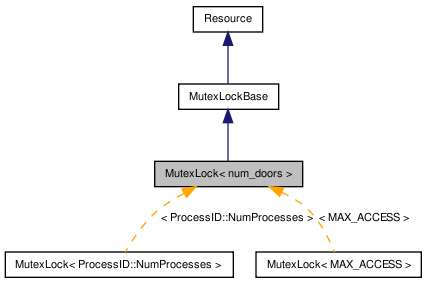MutexLock< num_doors > Class Template Reference
Implements a mutual exclusion lock using pthread mutex. More...
#include <MutexLock.h>

Detailed Description
template<unsigned int num_doors>
class MutexLock< num_doors >
Implements a mutual exclusion lock using pthread mutex.
Use this to prevent more than one thread from accessing a data structure at the same time (which often leads to unpredictable and unexpected results)
The template parameter is not used (only needed if compiling with IPC enabled)
Locks in this class can be recursive or non-recursive, depending whether you call releaseAll() or unlock(). If you lock 5 times, then you need to call unlock() 5 times as well before it will be unlocked. However, if you lock 5 times, just one call to releaseAll() will undo all 5 levels of locking.
Just remember, unlock() releases one level. But releaseAll() completely unlocks.
Note that there is no check that the thread doing the unlocking is the one that actually has the lock. Be careful about this.
Definition at line 106 of file MutexLock.h.
Public Member Functions | |
| MutexLock () | |
| constructor, gets a new semaphore from the semaphore manager | |
| ~MutexLock () | |
| destructor, releases semaphore back to semaphore manager | |
| void | lock (int id) |
| blocks until lock is achieved. This is done efficiently using a SysV style semaphore | |
| bool | try_lock (int id) |
| attempts to get a lock, returns true if it succeeds | |
| void | unlock () |
| releases one recursive lock-level from whoever has the current lock | |
| void | releaseAll () |
| completely unlocks, regardless of how many times a recursive lock has been obtained | |
| unsigned int | get_lock_level () const |
| returns the lockcount | |
| int | owner () const |
| returns the current owner's id | |
Protected Member Functions | |
| virtual void | useResource (Resource::Data &) |
| marks the resource as in use | |
| virtual void | releaseResource (Resource::Data &) |
| releases the resource | |
Protected Attributes | |
| unsigned int | owner_index |
| holds the tekkotsu process id of the current lock owner | |
| Thread::Lock | thdLock |
| all the actual implementation is handed off to the thread lock | |
Friends | |
| class | MarkScope |
Constructor & Destructor Documentation
constructor, gets a new semaphore from the semaphore manager
Definition at line 109 of file MutexLock.h.
destructor, releases semaphore back to semaphore manager
Definition at line 112 of file MutexLock.h.
Member Function Documentation
| unsigned int MutexLock< num_doors >::get_lock_level | ( | ) | const |
returns the lockcount
Definition at line 156 of file MutexLock.h.
Referenced by MessageQueue< MAX_UNREAD, MAX_RECEIVERS, MAX_SENDERS >::sendMessage().
| void MutexLock< num_doors >::lock | ( | int | id | ) |
blocks until lock is achieved. This is done efficiently using a SysV style semaphore
You should pass some process-specific ID number as the input - just make sure no other process will be using the same value.
Definition at line 123 of file MutexLock.h.
Referenced by IPCEventTranslator::bufferRequest(), MotionManager::func_begin(), MotionManager::InitAccess(), MotionManager::lock(), MessageQueue< MAX_UNREAD, MAX_RECEIVERS, MAX_SENDERS >::sendMessage(), and MutexLock< MAX_ACCESS >::useResource().
| int MutexLock< num_doors >::owner | ( | ) | const |
returns the current owner's id
Definition at line 159 of file MutexLock.h.
| void MutexLock< num_doors >::releaseAll | ( | ) |
completely unlocks, regardless of how many times a recursive lock has been obtained
Definition at line 149 of file MutexLock.h.
Referenced by MessageQueue< MAX_UNREAD, MAX_RECEIVERS, MAX_SENDERS >::sendMessage().
| virtual void MutexLock< num_doors >::releaseResource | ( | Resource::Data & | d | ) | [protected, virtual] |
| bool MutexLock< num_doors >::try_lock | ( | int | id | ) |
attempts to get a lock, returns true if it succeeds
You should pass some process-specific ID number as the input - just make sure no other process will be using the same value.
Definition at line 132 of file MutexLock.h.
Referenced by MotionManager::trylock().
| void MutexLock< num_doors >::unlock | ( | ) |
releases one recursive lock-level from whoever has the current lock
Definition at line 140 of file MutexLock.h.
Referenced by IPCEventTranslator::bufferRequest(), MotionManager::func_end(), MotionManager::InitAccess(), IPCEventTranslator::post(), MutexLock< MAX_ACCESS >::releaseResource(), and MotionManager::unlock().
| virtual void MutexLock< num_doors >::useResource | ( | Resource::Data & | d | ) | [protected, virtual] |
Friends And Related Function Documentation
friend class MarkScope [friend] |
Definition at line 162 of file MutexLock.h.
Member Data Documentation
unsigned int MutexLock< num_doors >::owner_index [protected] |
holds the tekkotsu process id of the current lock owner
Definition at line 166 of file MutexLock.h.
Referenced by MutexLock< MAX_ACCESS >::lock(), MutexLock< MAX_ACCESS >::owner(), MutexLock< MAX_ACCESS >::releaseAll(), MutexLock< MAX_ACCESS >::try_lock(), MutexLock< MAX_ACCESS >::unlock(), and MutexLock< MAX_ACCESS >::~MutexLock().
Thread::Lock MutexLock< num_doors >::thdLock [protected] |
all the actual implementation is handed off to the thread lock
Definition at line 167 of file MutexLock.h.
Referenced by MutexLock< MAX_ACCESS >::get_lock_level(), MutexLock< MAX_ACCESS >::lock(), MutexLock< MAX_ACCESS >::releaseAll(), MutexLock< MAX_ACCESS >::try_lock(), MutexLock< MAX_ACCESS >::unlock(), and MutexLock< MAX_ACCESS >::~MutexLock().
The documentation for this class was generated from the following file: